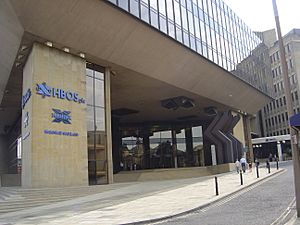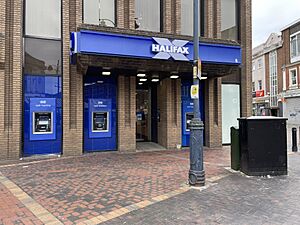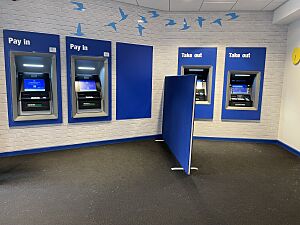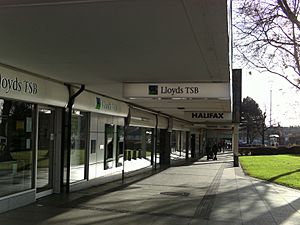Halifax (bank) facts for kids
 |
|

The Halifax Trinity Road Headquarters
|
|
|
Trade name
|
Halifax |
|---|---|
| Division | |
| Industry | Finance and insurance |
| Founded | 1853 |
| Headquarters | The Halifax Building Halifax, West Yorkshire, UK |
|
Area served
|
United Kingdom |
|
Key people
|
Russell Galley retired May 2023 (managing director) |
| Products | Financial services |
| Parent | Bank of Scotland plc |
Halifax is a well-known British bank. It is part of the Bank of Scotland, which is owned by a larger company called Lloyds Banking Group.
The bank is named after the town of Halifax, West Yorkshire, in England. It started there in 1853 as a "building society." A building society is a financial organization where people save money, and that money is then lent to others to buy homes. By 1913, Halifax had become the biggest building society in the UK.
In 1997, Halifax changed from being a building society owned by its members to a public company called Halifax plc. This meant its shares could be bought and sold on the stock market. Later, in 2001, Halifax plc joined with the Bank of Scotland to form a new group called HBOS. In 2009, HBOS, including Halifax, became part of the Lloyds Banking Group.
Contents
How Halifax Started
The Early Years (1853-1903)
Halifax began from a group called the Loyal Georgian Society. This group used to lend money. When they stopped lending, leaders in Halifax town decided to create a new organization. This became the Halifax Permanent Building and Investment Society in 1853.
A young lawyer's clerk named Jonas Tylor, who was 24, became the Secretary. He helped the society grow by opening many branches. In its first year, three branches opened. By 1862, there were 12 branches, all in Halifax. The first branch outside Halifax opened in Huddersfield in 1862.
Halifax also helped local businessmen build homes for workers. For example, they helped finance the Akroydon model housing scheme in the 1860s. By 1902, Halifax had 11 main branches in Yorkshire cities and 49 smaller ones.
Growing Across the UK (1903-1938)
After Jonas Tylor, Sir Enoch Hill took over in 1903. He was a very important person in the history of building societies. Hill decided to focus on helping people buy their own homes, especially cheaper ones.
By 1913, Halifax was the largest building society in the UK based on its total money (assets). After WWI, Halifax started to open branches all over the country. The first branch in the south opened in Shaftesbury in 1919. The important London office opened in 1924. Between 1918 and 1928, about 100 new branches opened.
In 1928, Halifax merged with another large building society called Halifax Equitable Building Society. This made Halifax even bigger. Sir Enoch Hill retired in 1938, after leading Halifax for 35 years. During his time, Halifax's assets grew from £47 million to £123 million.
A New Headquarters

In 1973, a new main office was built in Trinity Road, Halifax. This building had a unique diamond shape. It was often shown in Halifax's advertisements during the 1980s and 1990s.

Becoming a Bank
Changes in the 1980s and 1990s
In the 1980s, new laws allowed building societies more freedom. Halifax started to offer more services, like current accounts and credit cards, which were usually offered by banks. They also bought an estate agent company to help with home sales. In 1993, they even started a branch in Spain, Banco Halifax Hispania, to help British people buying homes there.
The new laws also allowed building societies to become public companies. In 1995, Halifax announced it would merge with another society, the Leeds Permanent Building Society, and become a public company. On June 2, 1997, Halifax became Halifax plc. Over 7.5 million customers became shareholders, which means they owned a small part of the new bank. This was the biggest number of new shareholders in UK history.


As Halifax plc, it was the fifth largest bank in the UK. Halifax continued to grow. In 1996, it bought a life insurance company called Clerical Medical Fund Managers. In 1999, it bought the Birmingham Midshires Building Society. In 2000, Halifax started Intelligent Finance, a bank that worked mainly by phone and internet.
Joining HBOS and Lloyds Banking Group
In 2001, Halifax merged with the Bank of Scotland to create a new group called Halifax Bank of Scotland (HBOS). The main office for HBOS was in Edinburgh. Both Halifax and Bank of Scotland continued to be used as brand names.
In 2006, a law was passed to simplify HBOS's structure. This meant that Halifax plc's assets and responsibilities were officially transferred to Bank of Scotland plc. Halifax continued to be a brand name, but it was no longer a separate legal company.
In January 2009, Lloyds Banking Group bought HBOS. This meant that Bank of Scotland plc, including the Halifax brand, became a part of Lloyds Banking Group.
In February 2009, Halifax changed its current accounts. They introduced new daily fees for arranged and unarranged overdrafts. They also started offering a £5 monthly payment for customers who met certain conditions on their 'Reward current account'. These changes caused a lot of discussion in the media.
In October 2009, Halifax Estate Agency was sold and its branches were renamed. In November 2009, a power failure at an IT center caused problems for all Halifax branches, cash machines, and online banking for several hours.
Advertising
Halifax started a very successful advertising campaign on Boxing Day in 2000. This campaign continued even after HBOS was created.
Halifax has also made adverts that feature characters from popular shows and movies. These include The Flintstones, Top Cat, Scooby-Doo, The Wizard of Oz, and Thunderbirds. In February 2021, a Halifax TV advert featured the Oasis song "Stand By Me".
See also
 In Spanish: Halifax Bank para niños
In Spanish: Halifax Bank para niños
- Sabadell Solbank
- Halifax (Irish bank)
- Bank of Scotland International
External links
- Bank of Scotland plc
- Lloyds Banking Group
- Halifax Contact Details
de:Halifax (Bank)
 | Delilah Pierce |
 | Gordon Parks |
 | Augusta Savage |
 | Charles Ethan Porter |




